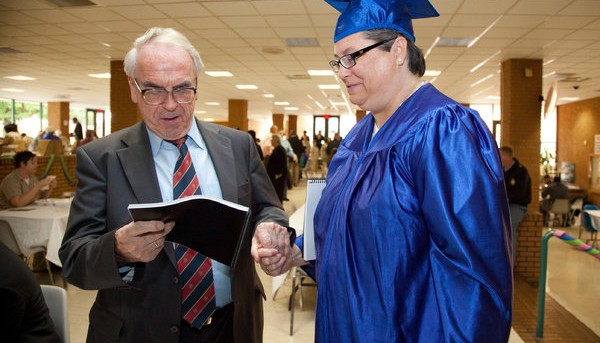Friends, no excerpt today. The work of theology I want to share today comes from Moltmann’s life, not his books.
Over the weekend the New York Times ran an article about a death row inmate in Georgia who has become friends with Moltmann. Kelly Gissendaner is scheduled to be put to death tonight by lethal injection for the part she played in influencing her boyfriend to murder her husband. She admits she did it. She’s spent 17 years in prison paying her penance. She’s also spent the last five years participating in a prison theology studies program, where she read works by Bonhoeffer, Catholic activist Dorothy Day, and Moltmann. She was drawn to Moltmann because of his work on hope. And of course, I’m sure she resonated with his own experience as a prisoner of war in WWII, which is where he first read the Scriptures and became a follower of Jesus.
Gissendaner wrote Moltmann a letter. He wrote back. Over the years, they have exchanged, Moltmann guesses, about 20-30 letters between them.
In 2011, Moltmann traveled to speak at Emory and asked if he could visit Ms. Gissendaner. It happened to coincide with the graduation ceremony of their theology program, so Moltmann gave the commencement address.
Think of that: Moltmann, the world’s foremost theologian, gave a commencement address NOT AT EMORY but to ten or so female prison inmates in Atlanta.
In 2012, Moltmann hadn’t received a letter from her in a while and became worried, so he reached out to their mutual friend to make sure she was okay. She had moved prisons.
Moltmann has written a letter to the courts advocating for Kelly’s life. He has born witness to her heart, which has repented and changed. So far, the courts have denied clemency.
In his letters to her, he has encouraged her to continue her studies, told her she was intelligent, and praised her own writing efforts in a devotional book she’s written.
Moltmann knows that we have all participated in death, chosen it over life. Some of us, like Kelly Gissendaner, have done this more literally than others. But the good news is that despite our participation in death we have been offered participation in life. We are given new mercies every morning, despite the evils of the night before. This is so hard for us to accept. It’s hard for us to accept it ourselves, even harder for us to accept it as it relates to others. The love of God is scandalous.
I’m grateful for Professor Moltmann, who embodies such grace, humility and love in the way he lives his life, in his earnest friendship with a fellow inmate, in his search for justice for one who has been redeemed and is living now into life and not death.
I’m grateful for Kelly, whose life has been changed because she accepted the radical invitation to choose love even after wrongly choosing hatred in ways that still echo harm through the life she was part of taking. Thanks be to God that we are not seen as we deserve, but as children of God who are loved and forgiven. She has found ways to live out that love and forgiveness in her relationships with her fellow inmates. Life happens, even in prison, even to conspiring murderers, because God desires all to come to know life abundant.
I’m praying for Kelly today, and for the courts in Georgia who hold her life in their hands (although only God should have that right or responsibility). I pray Kelly will know peace that only comes from the love that will not let us go. Not any of us, not for any reason.
If you want to speak up on behalf of Kelly, you can sign a petition asking for mercy for her here.

Please give Kelly more tim on our earth!
Please give Kelly more time on our earth!
Isn’t prison a place for reformation? And when reformation is shown by example, shouldn’t that be rewarded? This woman can change loves from her place in prison, let her do that by the hand of God.
Agreed, Maggie. If the prison system wants to be seen as legitimate, it should show that it values reformation, since that’s the point after all…. I don’t know what other ethic should guide their decision on the matter.